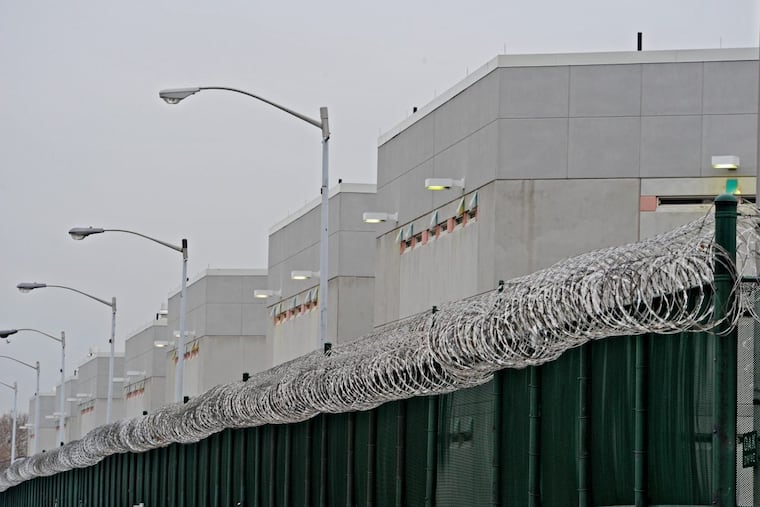As Philly jail population declines, where are the savings?
Philadelphia leaders have worked to reduce the city's jail population by a striking 28 percent in two years, with help from a MacArthur Foundation grant announced in 2016. Now, City Council officials and advocates want to know why costs have not fallen accordingly.

Philadelphia leaders have worked to reduce the city's jail population by a striking 28 percent in two years, with help from a MacArthur Foundation grant announced in 2016. Now, City Council officials and advocates want to know why costs have not fallen accordingly.
"I just can't understand why the prison population's going down and we're not seeing some of the savings we should be seeing," Councilwoman Cindy Bass said at a hearing on the Department of Prisons' budget request, which was $256 million before fringe benefits — down 1.7 percent over the last two years. "If we were a business, we'd be out of business operating in this way."
The inmate population totals 5,359, compared with 7,400 inmates two years ago. Yet, the number of staff at the prisons remains the same. And, by Councilman Allan Domb's calculations, the cost per inmate has ballooned from $43,902 to $66,661 in two years.
Meanwhile, outside City Hall, hundreds of demonstrators, including formerly incarcerated people, victims' advocates, immigration activists and civil rights proponents, gathered for a May Day rally to protest what they consider to be an excessive level of criminal justice spending.
"Together, the police, the district attorney, the prisons, and the courts, their budgets amount to $1.1 billion. That's more than a quarter of the entire city budget proposal," Kempis Songster, a recently released juvenile lifer, said to the crowd, which was organized by the Coalition for a Just District Attorney. "Is there some other way we could spend that money? How about schools?"
Philadelphia Prisons Commissioner Blanche Carney said the department has actually been able to find $11 million in savings from last year. However, it reinvested a portion of that savings in necessary programs including hepatitis C testing, the creation of a new behavioral health transition unit, and medication-assisted treatment for opioid addiction.
They detoxed 6,000 people from opioids last year; that's nearly one in five inmates admitted into the jails. Carney also said the department is seeking state support to provide naloxone kits to every inmate upon release from the jail.
Domb questioned why the budgeted medical costs were set to increase, even as the population is falling.
Dr. Bruce Herdman, the medical director for the jails, described a slew of challenges. For instance, the department ran up a $10 million pharmacy bill last year, 70 percent of which was for HIV medications. One inmate, a hemophiliac, required $100,000 a month worth of medication.
The prisons budget proposal also includes $7.64 million to be reinvested in initiatives related to extending the work that began under the MacArthur grant — including a mental-health initiative called Stepping Up, a pilot for Community Resource Centers, expanded diversion programs and, notably, funding to make up for the loss of the 30 percent fee the city takes out from money bail. Julie Wertheimer, chief of staff for criminal justice, said that was in anticipation of either eliminating the fee or terminating the use of money bail altogether.
A petition, launched at the protest, seeks the abolition of money bail along with half a dozen other changes, such as removing police from city schools, decriminalizing sex work, and keeping youth out of the adult criminal justice system.
The rally sought to position victims on the same side as the incarcerated, noting that many in Philadelphia have been in both positions.
One of them is Annie Jackson, 56, of Northeast Philadelphia.
"I have a child who has 25 to life, and one in the grave," she said. She herself recently spent a year in county jail on a probation detainer in connection with a 2008 retail theft charge, before she beat the gun and drug charges against her. "I'm out here 30 days trying to recapture my life and my space in the world. Everyone should be free until proven guilty."
One thing the protesters and some Council members seem to agree on: It's not enough that the city has pledged to close the decrepit, 91-year-old House of Correction by 2020. They should consider demolishing it, too.
Carney said a planning study was underway that should provide more information, but she expects demolition would cost roughly $7 million or $8 million, not counting the cost of moving important infrastructure that lies beneath the prison. She said maintaining the facility, even without inmates, would cost $700,000 a year in utility expenses alone.
Once the jail is closed, she said, the department will be able to curtail its overtime usage, which amounted to $24 million in 2017. She plans to create a unit of 45 officers who will cover shifts that traditionally required overtime.
Domb said, in that case, "I can tell you right now if we're paying a million dollars a year to keep it open vs. $7 million to demolish it, we should demolish it."
Besides, Bass said, it's not only a financial decision: "Demolishing the facility sends a message of who we are as a city and what we're going to do. … That might be a part of the thought process as well."